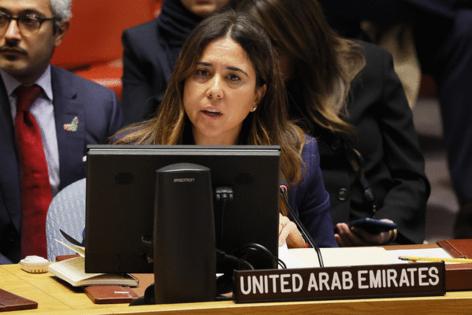UAE warns Israel annexing West Bank would be deemed 'red line'
Published in News & Features
The United Arab Emirates warned Israel that annexation of Palestinian territory in the West Bank would constitute a “red line” and “severely undermine” the regional vision for peace and integration underlying the U.S.-brokered Abraham Accords.
The comments represent the sharpest rebuke the UAE has directed at Israel since the start of the war in Gaza almost two years ago. They came shortly after Israeli Finance Minister Bezalel Smotrich on Wednesday urged Prime Minister Benjamin Netanyahu to call a Cabinet meeting and approve the extension of Israel’s grip over the West Bank.
“Annexation in the West Bank would constitute a red line for the UAE,” assistant minister for political affairs at the UAE’s foreign ministry, Lana Nusseibeh, said in remarks shared with several media outlets, including Bloomberg News.
Taking over Palestinian territory “would severely undermine the vision and spirit of Accords, end the pursuit of regional integration and would alter the widely-shared consensus on what the trajectory of this conflict should be – two states living side by side in peace, prosperity, and security,” Nusseibeh said.
She didn’t specify what Abu Dhabi would do if Israel went ahead with its proposal and whether this would lead to the severing of diplomatic ties between both states. Nusseibeh called on the Israeli government to suspend the plans.
Israel’s parliament passed a resolution in July calling for the annexation of Jewish settlement blocs in the West Bank, with the prime minister voting in favor. He’s since been reticent to clarify whether and when this might happen. Israeli cabinet ministers are due on Thursday to discuss West Bank policy and the Palestinian statehood drive, according to three officials. It wasn’t immediately clear if a formal annexation proposal was on the agenda.
Israel and the UAE normalized relations in 2020 as part of the Abraham Accords, which opened the door for Israelis to travel to the oil-rich Gulf state for business and tourism. The agreement earned the UAE political capital in Washington and gave it greater access to U.S. and Israeli technology in sectors including defense and security. U.S. President Donald Trump has said the expansion of the agreement to other countries, most notably Saudi Arabia, is a key foreign policy goal of his current administration.
UAE President Sheikh Mohamed bin Zayed arrived in the Saudi capital Riyadh on Wednesday and was received by Crown Prince Mohammed bin Salman, state-run WAM reported. They discussed the situation in the occupied Palestinian territories and affirmed “the importance of working to consolidate the pillars of regional stability, security, and peace by establishing a clear path to a lasting, comprehensive, and just peace based on the two-state solution,” said WAM.
The two Gulf leaders, who have had their differences in the past, were shown warmly embracing each other, according to photos released by the official Saudi Press Agency.
French President Emmanuel Macron said on Tuesday he and Saudi Crown Prince Mohammed would co-chair a conference on the viability of a two-state solution — meaning the establishment of a Palestinian state alongside Israel — in New York on Sept. 22. That would be just before the annual U.N. General Assembly in the same city.
The Trump administration last week said it would deny visas to Palestinian officials looking to attend the event, breaking with decades of precedent.
Israel’s relations with the UAE have been tested by its war in Gaza, which it launched against Iran-backed Hamas in the aftermath of the Oct 7, 2023 attack by the Palestinian militant group, designated a terrorist organization by the U.S. and many other governments.
Ties have been strained further over the past few weeks over comments made by Netanyahu about his embrace of a vision for “greater Israel.” Israel’s leader dispatched one of his top aides to Abu Dhabi last month to ease tensions between both sides.
“Extremists, of any kind, cannot be allowed to dictate the region’s trajectory,” the UAE’s Nusseibeh said. “Peace requires courage, persistence, and a refusal to let violence define our choices.”
©2025 Bloomberg L.P. Visit bloomberg.com. Distributed by Tribune Content Agency, LLC.







Comments